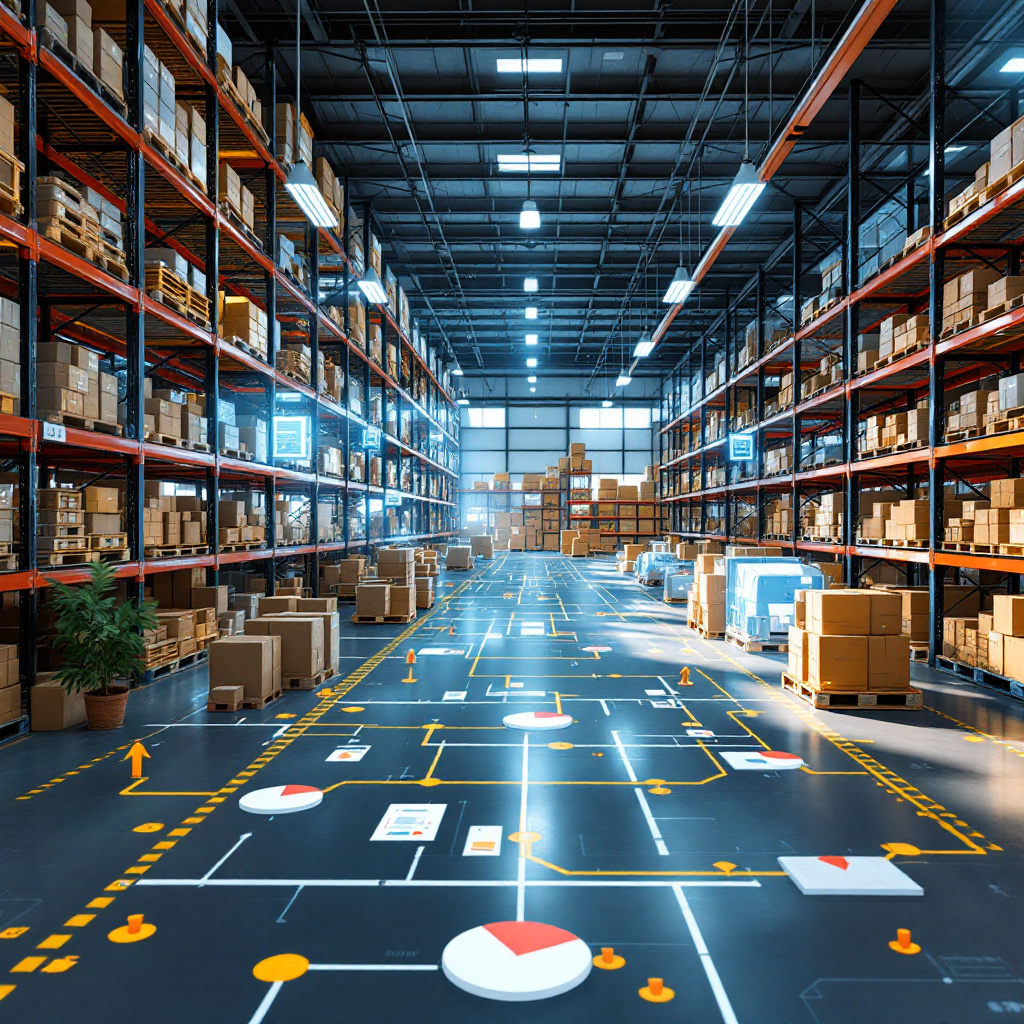ai in logistics: Revolutionising logistics operations
AI in logistics is transforming how supply chain operations are managed, helping organisations to boost efficiency, improve decision-making, and reduce operational expenses. In the logistics industry, the adoption of LLMs is dramatically enhancing automation capabilities, enabling companies to focus on core operations while reducing the manual data entry that often slows down workflows. According to industry data, LLM-powered systems could automate up to 80% of manual logistics tasks by 2025, such as filing customs documentation, generating freight labels, and updating shipment records.
Automation is producing measurable improvements. Reports show many logistics companies leveraging AI have experienced a 30–50% reduction in processing times for billing cycles and documentation. This not only accelerates turnaround times but also reduces costly processing errors. Human error rates in logistics paperwork have been cut by approximately 40% through AI-driven workflows, which makes logistics more efficient and predictable.
AI in logistics also plays a critical role in predictive analytics, helping logistics providers anticipate demand and adjust route planning for better transportation management. For small and mid-sized enterprises in particular, AI systems offer solutions to improve competitiveness by optimising the movement of goods across multiple markets.
With the rise of tools such as ChatGPT and Gemini, the logistics landscape is moving towards seamless integration of AI-driven automation in everything from repetitive tasks to complex processes. Services like virtualworkforce.ai are helping operations teams manage administrative tasks like data entry from emails more efficiently. By grounding responses in connected ERP and TMS systems, these no-code AI agents reduce email handling time dramatically.
As the future of logistics becomes increasingly shaped by generative artificial intelligence, businesses that leverage AI to automate workflows will gain a competitive edge. The ability of LLMs and machine learning algorithms to interpret unstructured data and integrate multiple data sources is setting new benchmarks for profitability in supply chain and logistics operations.

automation with llms: Streamlining documentation
Automation with LLMs is particularly effective in streamlining documentation tasks that have traditionally been labour-intensive. These models can perform data extraction from invoices, bills of lading, and customs forms, then convert unstructured text into clean, structured databases. This capability significantly reduces manual data entry, cutting turnaround times while improving accuracy in billing and tracking workflows.
Advanced optical character recognition and natural language processing allow LLMs to identify and categorise relevant fields within logistics paperwork. This transformation is vital for transportation management systems (TMS) and warehouse operations, where timely and accurate data plays a key role in maintaining efficiency. By automating routine documentation tasks, logistics companies can cut operational expenses and improve compliance rates.
One documented case showed an international freight forwarder achieving up to 25% cost savings through automated freight documentation. By replacing manual processes with AI-powered systems, they reduced human error, accelerated billing, and ensured faster clearance times.
This is where solutions like automating logistics emails in Microsoft 365 add value. Many logistics operations still process administrative tasks via emails from suppliers, clients, and customs. Virtualworkforce.ai uses LLM-based AI agents to read details from emails, logs them into ERP or WMS systems, and outputs consistent customer-facing responses. This not only reduces manual handling but also speeds up response times.
By integrating LLMs into documentation processes, organisations can streamline the flow of information across multiple platforms, freeing staff to focus on core operations. Combined with AI-driven automation, these practices deliver both cost savings and productivity gains that are closely tied to the profitability of logistics operations.
Drowning in emails? Here’s your way out
Save hours every day as AI Agents label and draft emails directly in Outlook or Gmail, giving your team more time to focus on high-value work.
llm as an ai agent: Automating communication and support
Deploying an LLM as an AI agent in logistics enables automation of customer communication and operational support. LLM-powered chatbots handle repetitive tasks such as answering FAQs, providing shipment updates, and managing exceptions. These AI-driven systems improve customer service, allowing human agents to devote more time to complex processes such as rate negotiations and supplier relationship building.
When applied effectively, such systems have shown a 40% reduction in support ticket volumes. This directly improves turnaround times for end customers. In one example, an LLM-driven deployment for an e-commerce fulfilment provider integrated external data from transport APIs to update customers in real-time about shipment statuses, effectively reducing operational friction.
Tools like automating shipment updates help logistics providers keep customers informed without pulling agents away from higher-value tasks. AI-powered communication platforms achieve this by connecting to both historical data and live systems like TMS, ensuring accurate, context-rich information is shared.
For global logistics operators, integrating AI agents into workflows is about more than customer service. These tools also act as internal assistants, automating administrative tasks from order entry to inventory checks. Natural language understanding lets them parse and respond to unstructured data, enabling seamless coordination between departments. By leveraging AI in these support functions, logistics companies enhance the efficiency of their supply chain and gain a tangible competitive edge.
ai-powered predictive insights: Optimising routes and inventory
AI-powered predictive insights in logistics transform how companies approach route planning and inventory management. By combining historical data with real-time input from IoT devices and transportation management systems, these tools generate accurate demand forecasting and suggest strategic route optimisation plans. Predictive analytics identifies inefficiencies, such as empty-mile journeys, and proposes changes that improve profitability.
For example, AI-driven planning has enabled a 15% drop in empty-mile journeys by suggesting more efficient distribution patterns. By optimising route schedules, companies reduce fuel expenses while ensuring timely delivery of goods. In warehouse environments, the same predictive capabilities help streamline stock allocation, improving inventory management and reducing storage costs.
Solutions like reducing logistics operating costs with AI show how integrating AI-driven automation in core operations yields significant returns. These systems pull from external data sources alongside internal order entry records to ensure every decision is grounded in facts, not guesswork.
Machine learning algorithms underpin these capabilities, learning from both historical data sets and ongoing operational results. By doing this, AI can automate certain tasks that previously demanded hours of human planning. This shift not only speeds operational decision-making but also supports sustainability goals by cutting unnecessary transportation miles.

Drowning in emails? Here’s your way out
Save hours every day as AI Agents label and draft emails directly in Outlook or Gmail, giving your team more time to focus on high-value work.
procurement and compliance automation with llms
Procurement and compliance are critical areas where LLMs offer measurable benefits. In procurement, LLMs can automate the creation of purchase orders, manage communications with suppliers, and conduct preliminary contract reviews. These automation capabilities help reduce manual workloads while ensuring consistent quality across multiple transactions.
Compliance automation is equally impactful. LLMs prepare and pre-fill customs documentation, significantly speeding up clearance processes. Businesses have seen clearance at ports occur up to 30% faster when AI systems prepare the necessary forms in advance, reducing the risk of non-compliance penalties. For shipments crossing multiple jurisdictions, this AI-driven accuracy is invaluable.
As highlighted in recent studies, the adoption of LLM in compliance tasks helps maintain organisational readiness for audits and inspections. By integrating seamlessly with transportation management and warehouse systems, AI ensures that records remain accurate and accessible.
In addition, the ability of AI to parse unstructured data means companies can capture details from emails and other communications to update procurement records automatically. For operations teams, this means fewer repetitive tasks and more time to focus on core operations. Advanced providers like reducing compliance risk with AI automation demonstrate how to implement these measures safely, with audit logs and role-based access maintaining governance standards.
automation challenges in logistics: Best practices for LLM integration
While the benefits are substantial, integrating LLMs into logistics operations comes with challenges. Data privacy, model transparency, and the need to handle domain-specific jargon must be addressed before full-scale adoption. Best practices include training on logistics-specific datasets to enhance model accuracy and consistency.
Experts emphasise the importance of verifying AI outputs with human oversight. As Sarah Lissack notes, organisations should seek out primary sources and statistical data to verify any AI-generated claims or predictions. This approach builds trust and ensures reliability in complex supply chain and logistics environments.
To integrate AI-driven automation safely, companies should consider incremental rollouts. Starting with low-risk processes allows teams to assess model performance before expanding into critical workflows. Combining AI with robotics in warehouses can further enhance capabilities, though both require robust cybersecurity measures to protect sensitive data sources.
A practical method is to focus on automating routine workloads like order entry before progressing to complex processes. This staged adoption supports both performance optimisation and staff adaptability. By following these guidelines, logistics companies can fully leverage the advantages of LLMs while mitigating risk.
FAQ
What is the role of AI in logistics today?
AI in logistics enhances efficiency by automating repetitive processes, providing predictive analytics, and improving communication. Companies use AI to reduce costs, speed operations, and minimise errors in supply chain management.
How do LLMs help automate logistics tasks?
LLMs process unstructured data and generate structured outputs, making them effective for documentation, communication, and decision support in logistics. They reduce manual work and improve data accuracy across workflows.
Can AI improve shipment tracking?
Yes, AI uses real-time data from various sources to provide accurate, timely shipment updates. This reduces customer inquiries and accelerates issue resolution.
What efficiency gains can be expected from AI automation in logistics?
Many logistics firms report a 30–50% reduction in documentation processing times. AI also cuts human error rates by up to 40%, leading to faster and more reliable operations.
Is AI suitable for small and mid-sized logistics companies?
Absolutely. AI systems scale to organisation size, and small and mid-sized firms can benefit significantly from reduced operational expenses and better resource allocation.
What are predictive insights in logistics?
Predictive insights use historical and real-time data to forecast demand, optimise routes, and prevent inefficiencies. This results in cost savings and improved delivery times.
How does AI support procurement in logistics?
AI automates purchase order generation, manages supplier communications, and ensures compliance by pre-filling documents. This reduces manual workload and errors.
What challenges exist in adopting LLMs for logistics?
Challenges include ensuring data privacy, handling industry-specific language, and maintaining transparency. Continuous training on sector-specific data mitigates these issues.
How can LLMs impact customer communication?
LLMs enable chatbots and AI agents to handle routine inquiries and updates, freeing agents for complex interactions. This speeds up turnaround times and increases customer satisfaction.
Are AI and machine learning the same in logistics applications?
AI is the broad field, while machine learning is a subset that powers predictive and adaptive capabilities. In logistics, both work together to deliver automation and decision-making enhancements.
Ready to revolutionize your workplace?
Achieve more with your existing team with Virtual Workforce.